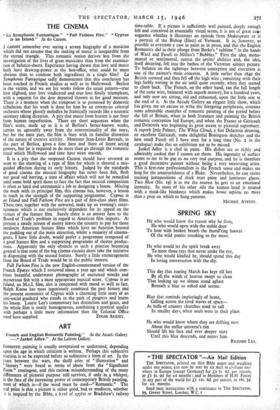THE CINEMA
La Symphonie Fantastique." " Full Fathom Five." " Cyprus is an Island." At the Curzon.
I CANNOT remember ever seeing a screen biography of a musician which did not assume that the making of music is inseparable from the eternal triangle. This romantic notion derives less from the investigation of the lives of great musicians than from the examina- tion of balance-sheets. Experience having shown that love and music both have drawing-power at the box-office, what could be more obvious than to combine both ingredients in a single film? La Symphonie Fantastique sadly demonstrates that this conclusion has been reached in French studios as well as in Hollywood. Berlioz is the victim, and we sec his works follow the usual pattern—true love slighted, true love vindicated and true love finally triumphant, with a requiem for the dear departed thrown in for good measure. There is a moment when the composer is so possessed by domestic tribulation that his work is done for him by an enormous celestial orchestra whose ghostly melodies he frantically records like a neurotic secretary taking dictation. A pity that music from heaven is not freer from human imperfection. There are short sequences when the film's score, made up as it is of Berlioz's better-known works, carries us agreeably away from the conventionality of the story, but for the most part, the film is busy with its familiar distortion of the nature of creative activity. Monsieur Jean-Louis Barrault, in the part of Berlioz, gives a hint here and there of latent acting powers, but he is required to do more than go through the romantic ritual which Hollywood and time have worn smooth.
It is a pity that the reopened Curzon should have reverted so soon to the showing of a type of film for which it showed a mis- guided affection during its early history. Judged by the standards of good cinema the musical biography has never been fish, flesh nor good red herring, a state of affairs which will not be remedied until some bold spirit dares to face the fact that musical composition is often as hard and unromantic a job as designing a house. Missing the mark with its principal film, this cinema has, however, a lesson to teach in the strength of the supporting programme. Cyprus is an Island and Full Fathom Five are a pair of first-class short films. These two, together with the newsreel, make up an evening's enter- tainment which is not exclusively dependent for its appeal on the virtues of the feature film. Surely there is an answer here to the Board of Trade's problem in regard to American film imports. At present a steady stream of money leaves the country to pay for those mediocre American feature films which have no function beyond the padding out of the main attraction, whilst a majority of cinema- goers, I have little doubt, would prefer a programme composed of a good feature film and a supporting programme of shorter produc- tions. Apparently the only obstacle to such a practice becoming general is that none of the big cinema circuits dares take the initiative in dispensing with the second feature. Surely a little encouragement from the Board of Trade would be in the public interest.
Full Fathom Five is the new English-commentated version of the French Epaves which I reviewed about a year ago and which com- bines beautiful underwater photography of encrusted wrecks and mysterious fish with a most appropriate musical score. Cyprus is an Island, an M.o.I. film, also is concerned with mood as well as fact. Ralph Keene has most ingeniously combined the past history and the present economics of Cyprus with a charming little story of an anti-social goatherd who stands in the path of progress and learns his lesson. Laurie Lee's commentary has distinction and grace, and the whole film is neatly homogeneous, combining a poetical quality with perhaps a little more information than the Colonial Office


























 Previous page
Previous page